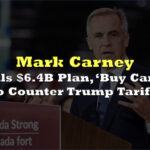The announcement of Donald Trump’s sweeping tariff proposals sent immediate shockwaves through global markets, but beneath the initial panic lies a more nuanced reality for Canadian investors. While Bay Street analysts scramble to quantify potential impacts, several TSX heavyweights are quietly positioning themselves to weather—and potentially capitalize on—the shifting trade landscape.
“Markets react to uncertainty with volatility, but smart money follows adaptability,” explains Michael Davidson, chief economist at RBC Capital Markets. “Several Canadian companies have spent years diversifying their supply chains precisely to mitigate this type of geopolitical risk.”
The proposed 10-20% tariffs on Canadian imports would undoubtedly create headwinds for cross-border trade, yet the narrative extends beyond simple cause-and-effect. Canadian National Railway and Canadian Pacific Kansas City have already signaled confidence in their ability to adjust shipping patterns to accommodate changing trade flows. Their extensive north-south networks could become increasingly valuable as companies restructure supply chains.
Resource giants like Nutrien Ltd. and Barrick Gold represent another category of potential beneficiaries. “Essential commodities operate under different market dynamics than manufactured goods,” notes Jennifer Williams, portfolio manager at TD Asset Management. “Global demand for potash and precious metals remains consistent regardless of trade policy, and Canadian producers maintain strong competitive advantages.”
The energy sector presents perhaps the most complex picture. While American refineries rely heavily on Canadian crude imports, making complete trade disruption unlikely, companies like Suncor and Canadian Natural Resources have spent years expanding their customer base beyond U.S. borders. Their forward-looking management teams have emphasized flexibility in quarterly earnings calls.
Tech standout Shopify demonstrates another dimension of resilience. “Software companies with global digital infrastructure aren’t bound by the same physical constraints as traditional exporters,” explains David Thompson, technology analyst at BMO Capital Markets. “Their ability to seamlessly serve markets worldwide creates natural insulation against regional trade tensions.”
Investors should note that market corrections following policy announcements often create entry points for quality companies with temporarily suppressed valuations. The CO24 Business team has tracked similar patterns during previous trade disputes, where initial pessimism gave way to more rational price discovery as actual impacts became clear.
“History suggests that diversified portfolios of fundamentally sound businesses outperform reactionary trading strategies during periods of policy uncertainty,” says Elizabeth Chen, chief investment strategist at Scotiabank. “The companies that have invested in operational flexibility and geographic diversification will demonstrate their advantage if these tariffs materialize.”
Canadian banks provide an instructive example. TD Bank and Royal Bank of Canada have extensively expanded their U.S. operations while maintaining strong domestic foundations. This dual-market presence creates natural hedges against policy shifts in either direction, potentially converting short-term market anxiety into long-term shareholder value.
As CO24 Breaking News continues monitoring developments in this evolving story, investors would be wise to look beyond headlines and examine the underlying adaptability of Canada’s market leaders. The companies that have prepared for geopolitical turbulence may not only survive but thrive in the changing trade environment.
Will Trump’s tariff threats ultimately reshape North American commerce, or will they represent another negotiating tactic in the complex dance of international relations? The answer remains uncertain, but one principle endures: quality businesses with flexible operations have historically converted disruption into opportunity. For patient investors, the current market reaction may reveal hidden value in Canada’s most resilient enterprises.
























